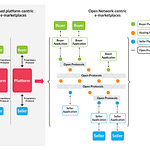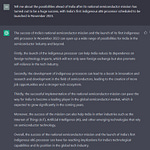Matsyanyaaya: The Effects of Tech Sanctions on the Russian Economy
— Arjun Gargeyas
An edited version of this article came out in Hindustan Times on March 16, 2022.
The current actions taken against Russia have mainly been in the form of targeting the Russian economy through sanctions and embargoes, specifically targeting sectors that Russia relies on export revenues. The US has also introduced high-tech sanctions, mainly depriving Russia of access to critical technologies (like semiconductors, quantum, artificial intelligence, and big data) and their applications.
This is the first time that specific embargoes have been put in place against the import and export of high-tech components targeting a particular country, in this case, Russia. The sanctions by the United States effectively prevent Russia from importing a range of products, from chips to telecommunications equipment. But what is noteworthy is that the sanctions prevent Russian imports of both American products as well as products manufactured in other countries that use proprietary technology of any American firm or company to manufacture the products under the sanctioned list. This would mean that any firm, located in any country around the world, cannot export certain products even if they have been manufactured on that country’s soil utilising any sort of American technology during the process of design and manufacturing. The sanctions also have the caveat that the export of dual-use devices is also prohibited.
Another significant aspect of these technology sanctions has been the varied responses by major technology companies themselves. While some companies have to fall in line with the government’s sanctions due to the usage of American IP, some tech giants have taken unilateral decisions to cut off ties with Russia and stop all business from the country. While unilateral decision-making by tech companies is not new, this large-scale shunning of Russia by major tech companies around the world should sound alarm bells to the Russian federation. It is important to understand how these decisions might spell trouble for the overall growth and development of the state’s economy.
Domestic Consumerism Takes a Hit
While the official technology sanctions mentioned that the supply of consumer goods to Russia and Belarus would not be disrupted, the actions taken by tech companies themselves can reduce the access to tech products for the average Russian consumer. Major electronic smartphone manufacturers like Apple and Samsung have paused product sales in the country. They have also cancelled all existing and future shipments of finished products (like mobile phones) to Russia. Other electronic goods manufacturers like Dell and HP, both leaders in laptops and personal computers production, have also halted operations and suspended the sale of all their products in Russia. This can hamper access to basic electronic goods like mobile phones and laptops for the domestic consumer.
It is also not just the individual consumer who will be affected. Companies that supply electronic goods on a large-scale basis to businesses and governments have also joined in the embargoes. Telecommunications equipment dealers like Nokia, Ericsson, and Cisco have all decided to stop all business in the country with no equipment being sold in the near future. On the semiconductor front, major companies like Intel and AMD have decided to stop the supply of chips. Taiwanese giant TSMC has also joined the sanctions train and suspended all chip supply and manufacturing contracts to Russia. This would mean that Russian sectors like the automobile and consumer electronics industry will suffer from a high shortage of semiconductor chips.
Web-Based Services and Online Sectors
Apart from the hardware front, the technology services and software industry has also taken a massive hit with the existing sanctions. Microsoft has prevented access to Skype, GitHub, and cloud-based services Azure. Netflix has stopped all streaming services in the country. Another critical company, Cloudfare, has vowed not to provide any protection for all Russian web resources. Website hosting sites like GoDaddy are now shutting down Russian websites and preventing any new ones with the .ru extension from going live. This could affect domestic businesses, with many relying on web-based services and social media for their marketing campaigns.
It is clear that the United States government sanctions on technology have triggered a chain reaction with each major technology company looking to impose its own restrictions on Russia. Significant economic repercussions must be expected due to these actions taken by companies. Revenues through import duties for technology goods and services would be cut off. There would also be a significant dip in access to technology goods in the market, thereby decreasing domestic consumption. Domestic businesses would bear the brunt of the sanctions with no access to social media sites and other critical software.
If you enjoy the contents of this newsletter, please consider signing up for Takshashila’s Graduate Certificate in Public Policy(GCPP) Programmes.
Click here to know more
Cyberpolitik : Tech-Geopolitics at the WTO
— Sapni G K
In this newsletter, we look at multiple interesting angles of the intersection of technology and geopolitics. Encountering trade as a major concern within these contours is not new, given that it is the most manifest expression of the intersection of geopolitics and trade. Around September 2021, there were reports about built-in censorship efforts on Chinese devices that were operated by Lithuanian officials. The matter had escalated to a point where the Lithuanian side decided to openly question the trade relationship between the two nations. The importance of Lithuania as one of the inroads into China’s European trade meant that this was not taken lightly.
By the end of January 2022, the European Union (EU) made a request for consultation at the World Trade Organization (WTO). According to the request submitted to the Dispute Settlement Body, the EU urged that the consequences of sparks that flew between Lithuania and China affected the overall trade in goods and services between the EU and China. It alleged that the measures taken by China violated the terms of the Marrakesh Agreement and the additional agreements such as the Trade Facilitation Agreement and the Agreement on the Application of Sanitary and Phytosanitary Measures.
The larger complaint raised by the EU concerns the disruption of the supply chain because of China’s actions in its trade with Lithuania. Specifically, the EU accuses the Chinese measures as
import bans or import restrictions on the products at issue, from the EU;
export bans or export restrictions on the products at issue from China to the EU; and
restrictions or prohibitions on the supply of services from the EU or by a service supplier from the EU in the territory of China or in respect of EU consumers of services provided by Chinese service suppliers.
The measures against Lithuania, and in extension, against the EU, challenge the notions of global free trade envisioned by the WTO. It also contributes to the Chinese imposition of censorship through interference, which is an obvious concern to the EU. The specific location of Lithuania makes it an important part of China’s Belt and Road Initiative and is important to both China and the EU. China’s tech prowess has been a comparative advantage for the trade-in this route, particularly in the case of eastern European nations. In the background of the continuous rise of Chinese influence in this sphere, this request for consultations is worth noting. Requests to join consultations have poured in from Australia, Japan, USA, Canada, the Separate Customs Territory of Taiwan, Penghu, Kinmen, Matsu, and the UK. Clearly, the quad nations except India are showing an active interest in taking up this matter. India should demonstrate its awareness that the technology game is political, and is a means to many ends in today’s world.
Dhruvapolitik: India’s Arctic Policy
— Aditya Pareek
India published its Arctic Policy last week. India’s engagement in Polar exploration and research goes back quite a while and is primarily motivated by scientific pursuits. There are some highlights from the policy I pointed out in a Tweet thread recently:

With the ongoing Ukraine conflict between Russia and Ukraine, there is a clear threat of food shortage because the two belligerents are major suppliers of grain to the world. Thankfully, India currently has enough grain and can even export. As the policy states, ensuring India can plan for safeguarding its development and food security goals requires studying weather patterns and the melting of ice and thawing of permafrost in the Arctic.


By arguing that the Himalayas are the third pole, India elevates its place in the geostrategic discourse. The centrality of the Himalayas to the global discipline of Meteorology can’t be overstated.


India’s certainly playing an important role in producing pharmaceuticals around the world and indeed as a major link in the global supply chains. However, the mention of traditional systems of medicine like Ayurveda, Sidha and Unani, is an imprint of the direction the Government of India takes to promote India’s cultural heritage. Another reason can be that the Arctic Council (cooperation with which is also a major priority in the policy) features discourse and sub-fora where similar traditions of the indigenous peoples of the Arctic are represented.


It is no secret that India’s oceanography/hydrography capability is well regarded in the world, with India’s National Hydrographic Office being the nodal agency. Indian Navy also plays the central role in not only staffing the NHO but also carrying out the actual surveys with dedicated research vessels in its fleet.
You can find out more about India’s hydrography capabilities in an article I wrote with Aditya Ramanathan in February 2021.


Finally, India does not have an official merchant marine but contributes one of the highest numbers of seafarers and crew to merchant vessels, hydrocarbon carriers(Natural Gas and Crude oil) and container ships worldwide. India can supply crew and professionals who will be important to meet the high demand ushered in by the increased viability of alternate shipping routes like the Northern Sea Route(NSR).


Our Reading Menu
[Blog] Yes, the UK is trying to Brexit the Internet by Heather Burns
[Policy Document] Tamil Nadu Data Policy 2022 by Government of Tamil Nadu
[Issue Brief] India’s Arctic Policy: Building a Partnership for Sustainable Development by Anurag Bisen
[Opinion] As China Threat Looms over Taiwan, This is How India Can Keep Global Chip Industry Afloat by Arjun Gargeyas, who is also a contributor to this newsletter.










